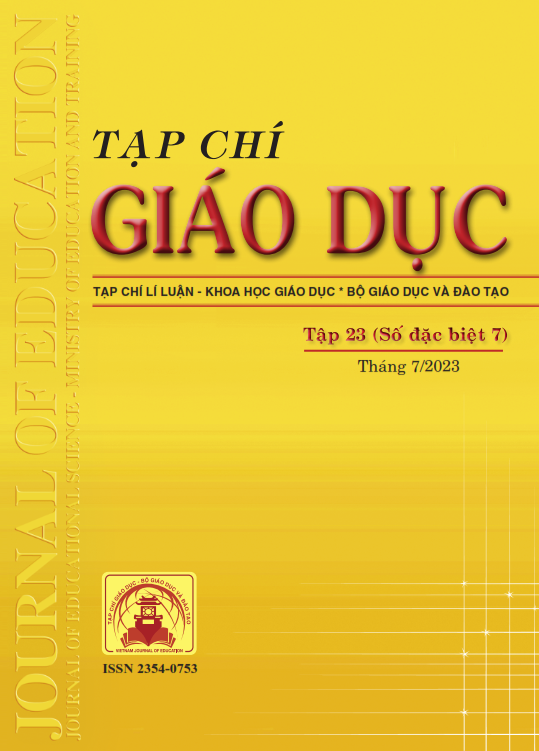Xây dựng website hỗ trợ dạy học chuyên đề “Thực hành hoá học và công nghệ thông tin” theo Chương trình giáo dục phổ thông 2018
Tóm tắt
Following the international chemistry education approach, new reform chemistry curriculum in Vietnam emphasises on equipping students with the concepts and methods of utilizing information and communication technology (ICT) tools. This is clearly demonstrated through the topic “Practice Chemistry and Information Technology” in Grade 10th Chemistry curriculum. Based on the TPACK model, principles and processes of developing instructional materials for this topic are proposed. In this topic, teachers not only utilize ICT tools to support the teaching process but also teach students how to use them to learn Chemistry. Survey results indicate that both in-service and pre-service chemistry teachers need the instructional materials to support teaching in this specialized topic it is new content compared to the 2006 curriculum.
Tài liệu tham khảo
Bộ GD-ĐT (2016). Thông tư số 12/2016/TT-BGDĐT ngày 22/4/2016 về việc Quy định Ứng dụng công nghệ thông tin trong quản lí, tổ chức đào tạo qua mạng.
Bộ GD-ĐT (2018a). Chương trình giáo dục phổ thông môn Hoá học (ban hành kèm theo Thông tư số 32/2018/TT-BGDĐT ngày 26/12/2018 của Bộ trưởng Bộ GD-ĐT).
Bộ GD-ĐT (2018b). Thông tư số 11/2018/TT-BGDĐT ngày 06/4/2018 về Ban hành tiêu chí để xác định hàng hóa chuyên dùng phục vụ trực tiếp cho giáo dục.
Bộ GD-ĐT (2021). Công văn số 4096/BGDDT-CNTT ngày 20/9/2021 về Hướng dẫn thực hiện nhiệm vụ ứng dụng công nghệ thông tin vào thống kê giáo dục năm học 2021-2022.
Chan, P., Van Gerven, T., Dubois, J. L., & Bernaerts, K. (2021). Virtual chemical laboratories: A systematic literature review of research, technologies and instructional design. Computers and Education Open, 2, 100053.
Chaudhary, B., & Nagar, U. P. I. (2018). The role of ICT in promoting constructivism. International Journal of Technical Research & Science, 3(1), 1-4.
Julboev, T. A., Sultonov, M. M., & Abduvalieva, K. K. (2021). Teaching chemistry computer software to students of chemistry in pedagogical higher education institutions. European Journal of Research and Reflection in Educational Sciences, 9(2056-5852), 23-28.
Keller, S., Rumann, S., & Habig, S. (2021). Cognitive load implications for augmented reality supported chemistry learning. Information, 12(3), 96.
Lok, W. F., & Hamzah, M. (2021). Student Experience of Using Mobile Devices for Learning Chemistry. International Journal of Evaluation and Research in Education, 10(3), 893-900.
Martinez-Jiménez, P., Pontes-Pedrajas, A., Polo, J., & Climent-Bellido, M. S. (2003). Learning in chemistry with virtual laboratories. Journal of Chemical Education, 80(3), 346-352.
Mishra, P., & Koehler, M. J. (2006). Technological Pedagogical Content Knowledge (TPACK) Framework-Educational Technology. Teachers College Record.
Shulman, L. S. (1986). Those who understand: Knowledge growth in teaching. Education Researcher, 15(2), 4-14.
Thủ tướng Chính phủ (2020). Quyết định số 749/QĐ-TTg ngày 30/6/2020 về phê duyệt “Chương trình Chuyển đổi số quốc gia đến năm 2025, định hướng đến năm 2030”.
Đã Xuất bản
Cách trích dẫn
Số
Chuyên mục
Giấy phép

Tác phẩm này được cấp phép theo Ghi nhận tác giả của Creative Commons Giấy phép quốc tế 4.0 .












